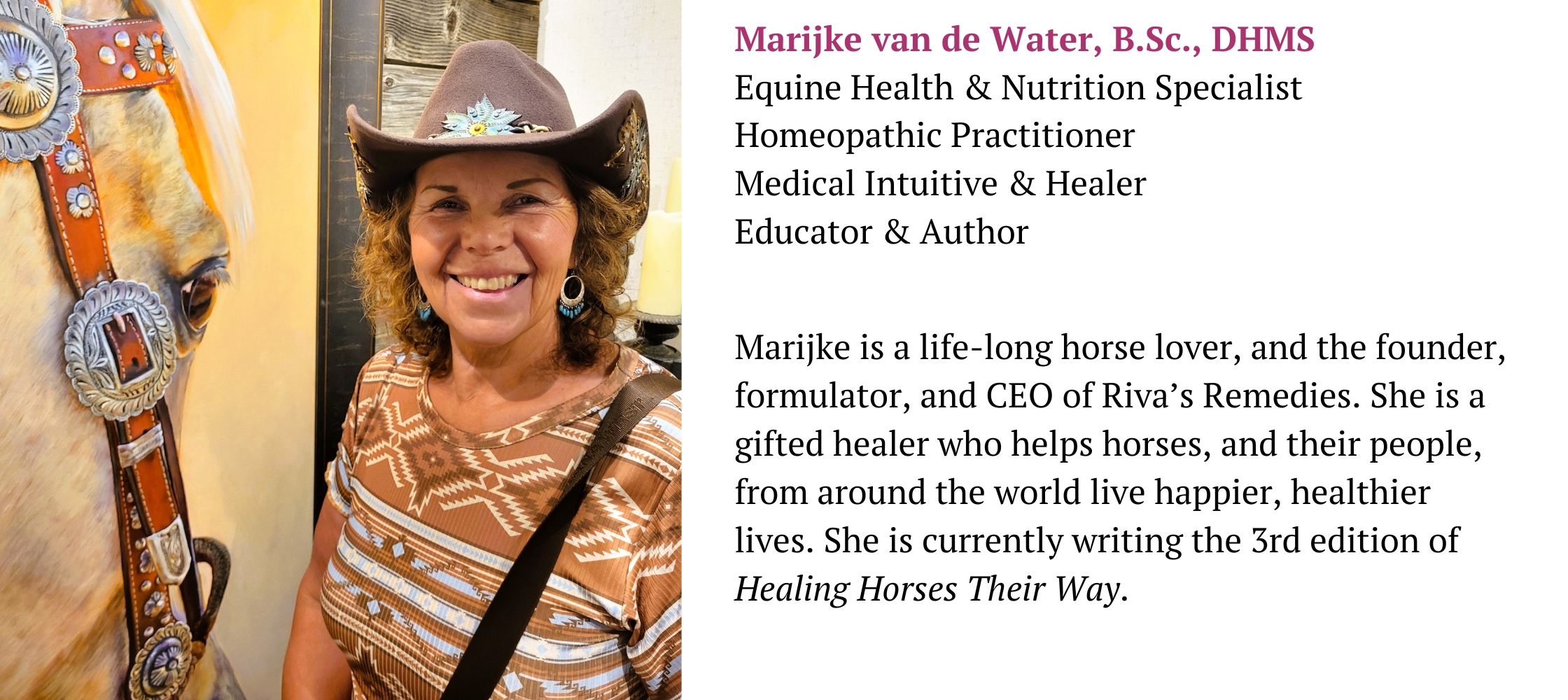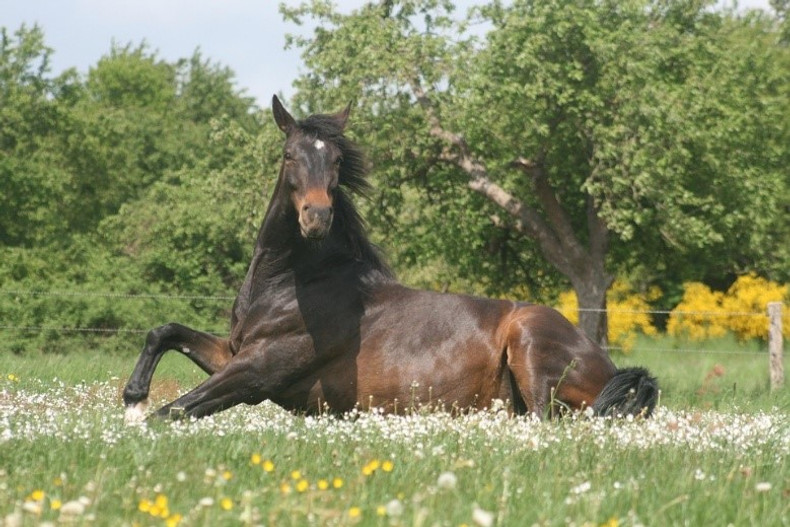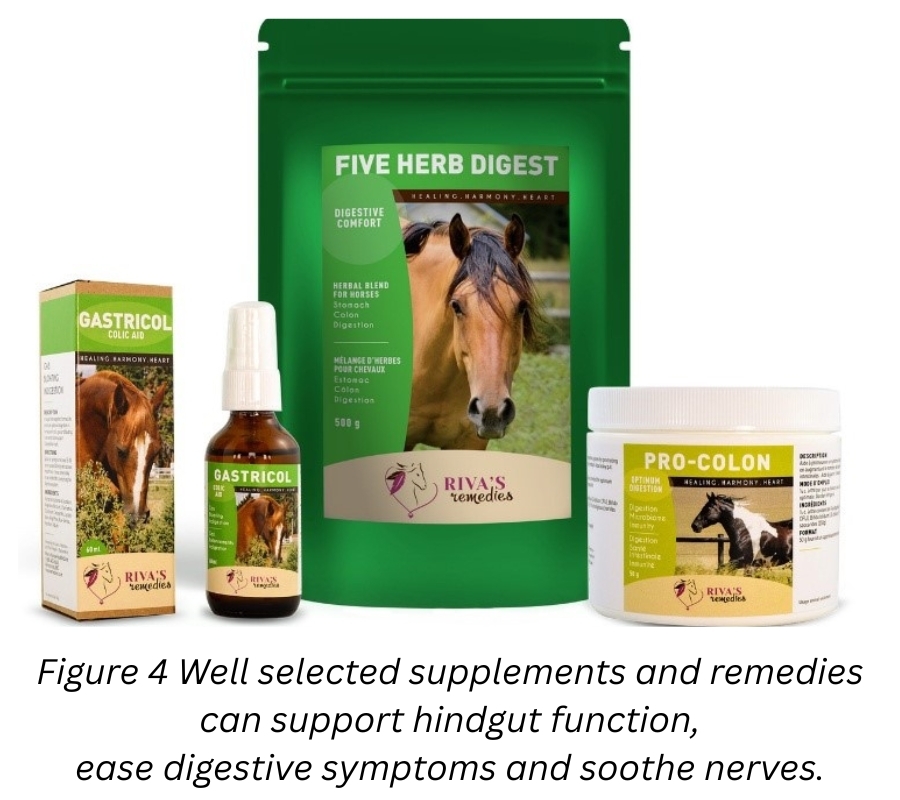Colic is still the number one cause of non-infectious death in domestic horses (aside from old age), and it is estimated that between 4 to 10 percent of all horses are diagnosed with colic every year. Ten percent of those horses end up on the operating table. So, how is this happening and how can we prevent these gut problems?
The intestines in the average horse are over 30 meters long from mouth to rectum with varying functions all along the way. And the hindgut itself holds over 100 litres of feed material. So, this is a long digestive road where things can go awry when the conditions are not right for the horse.
Despite the high incidence of colic and the complexity of their digestive system, a horse’s intestinal function is remarkably efficient, albeit under suitable conditions. The problem starts in the domestic environment. Equine hindguts are significantly impacted by modern feeding programs, domestic lifestyles, lack of or too much exercise, stress, and over-medicating. That means there are a lot of factors under our control, which we can modify in favour of horses. Let’s learn how…
What is Colic?
Colic is described as any kind of abdominal pain, no matter the cause. It is not actually a disease but a group of symptoms that horses display to show their intestinal discomfort. In pathology, it refers to severe spasms of pain in the hindgut caused by obstruction, impactions, distension (bloating), or twisting, all of which result in excessive peristaltic contractions. While some cases of colic are mild it can also be a grueling and very painful experience for many horses.
There are three different types of colic:
1. Intestinal dysfunction is the most common and results in bloating and pain. If the gas causes contractions 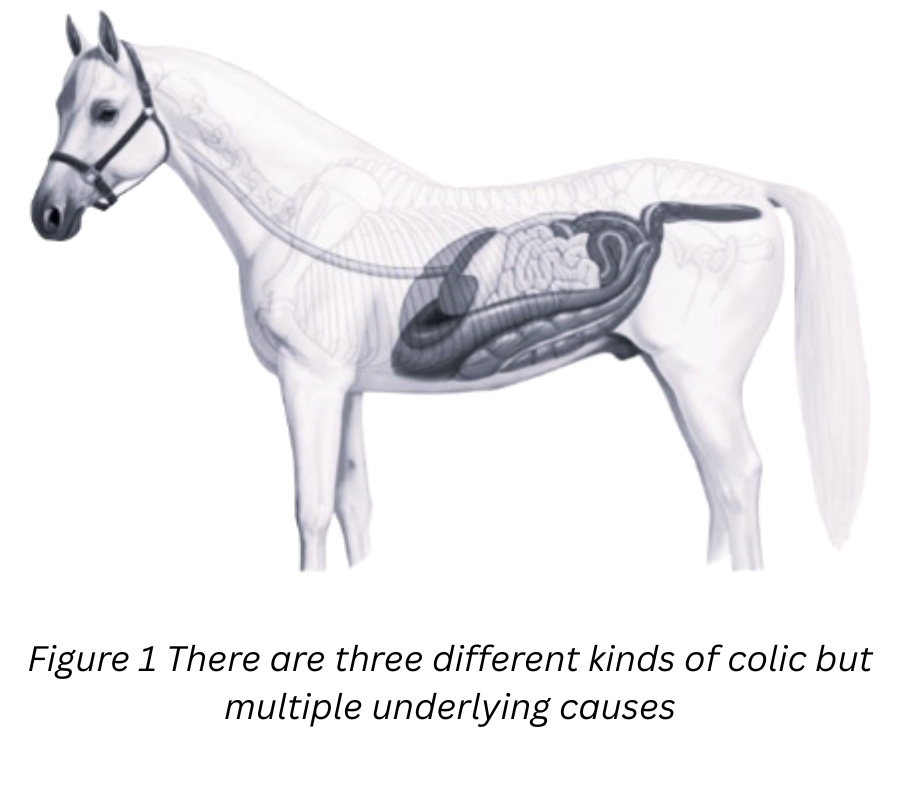 or spasms it is known as spasmodic colic. Extreme gas can cause displacement of the colon. Impaction colics are a result of feed material accumulating and getting stuck in the flexures of the intestines particularly at the pelvic and right dorsal colon which is where, not surprisingly, most ulcers develop.
or spasms it is known as spasmodic colic. Extreme gas can cause displacement of the colon. Impaction colics are a result of feed material accumulating and getting stuck in the flexures of the intestines particularly at the pelvic and right dorsal colon which is where, not surprisingly, most ulcers develop.
Examples of impaction colics include sand colic, an overload of parasites, and tumours or polyps which block the intestinal tract. Once a blockage occurs, the peristalsis action becomes weaker and more sluggish. Therefore, colic symptoms can be mild at first, worsening over several days.
2. Intestinal accidents happen due to colon displacements, twisted intestines, and strangulations. And even though these are deemed as “accidents”, they are mostly caused by digestive stress and dysfunction often not recognized until after the accident, if at all.
3. Inflammation or ulceration of the intestinal membranes can cause colic and are mostly a result of digestive dysfunction.
Common Symptoms of Colic
- Biting or looking at their sides
- Bloating and gas
- Breathing faster
- Eating or drinking less than usual
- Increased heart rate to over 45-50 beats per minute
- Kicking at the belly
- Lip curls
- Lying down more often or repeatedly laying down and getting up
- Manure sizes decrease or the balls get smaller
- Pawing
- Rolling frequently
- Stretching out
- Sweating
- Teeth grinding
Prevention is the Key
Thankfully, most horses pull through a colic episode with no long-lasting health effects. Nevertheless, we lose too many horses to colic, which is the number one medical cause of death. This is largely due to our management (or more accurately mismanagement) routines and our horse-keeping practices, both of which, as discussed, can create strong risk factors. Especially if we are focused on our needs instead of our horses’ needs. We humans can be a dangerous business for horses. Remember, horses are sentient beings first and commodities second.
Don’t wait to implement prevention strategies!
Under unnatural conditions, there are many different reasons horses can colic and there is no guarantee as 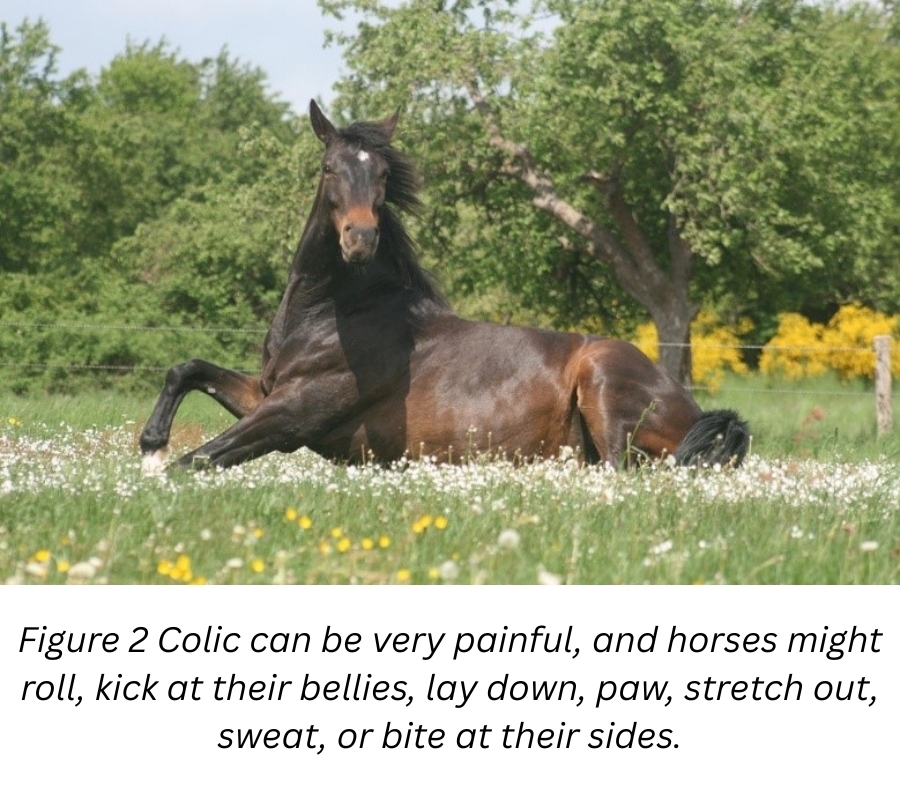 to which treatment will most effectively resolve the issues because we are not usually seeing the underlying cause(s). So, we need to be more astute in interpreting their communications, understanding what led to the digestive crisis (often not what you think), and catching them before they get too far. Labelling colic as idiopathic (i.e., no known cause) isn’t good enough and does nothing to resolve the crisis at hand or prevent any future episodes.
to which treatment will most effectively resolve the issues because we are not usually seeing the underlying cause(s). So, we need to be more astute in interpreting their communications, understanding what led to the digestive crisis (often not what you think), and catching them before they get too far. Labelling colic as idiopathic (i.e., no known cause) isn’t good enough and does nothing to resolve the crisis at hand or prevent any future episodes.
Horses with chronic or repeated colic issues are sending out strong messages that they are either in an intolerable stress situation (as they perceive it) or the hindgut microbiome has become so unbalanced due to feed issues, lack of exercise, parasites, nutrient deficiencies, etc. that they can no longer function normally. Even horses with mild cases of colic are trying to tell us something. This is the basic premise of the natural defense mechanism; the body expresses itself and its underlying imbalances through symptoms of pain and discomfort.
The first most important step we can take is to prevent colic in the first place, which means removing the risk factors. It’s easier to stop an illness from happening than it is to stop it after it has already happened.
So Which Factors Put Domestic Horses at Risk?
- Confinement or stalling, or horses without enough turn-out.
- Feeding infrequently. Not enough food leaves them standing around with empty stomachs which promotes excess acid and stress. Use slow feeders.
- Dental problems because they can’t chew their food adequately.
- Grain based feed. Avoid corn, oats, and barley, and feed concentrates. These cause excess fermentation and gas.
- Dehydration because the feed and forage becomes hard and dry resulting in impaction. Make sure the water is not too hot, too cold, or frozen.
- Parasite loads. Small strongyles and tapeworms most commonly cause colic. They are often not found during routine fecal testing.
- Sandy ground without adequate grazing or forage which encourages them to lick sand.
- Stressed horses. Hormonal mares, changes in herd dynamics, boredom, over-training, isolation, too much travel, and too much competition are all risk factors.
- Horses who have recently experienced some kind of trauma such as, losing a horse friend, losing a human friend, being sold, having to move, fearing they will lose their “person”, or physical injury.
- Health problems such as ulcers, leaky gut, gastric acidity, hormone issues, toxicity, and physical pain.
**Horses with the lowest incidence of colic include retired horses, lesson horses, non-competitive horses, and horses in a more natural environment with freedom to forage, as opposed to stabling and traditional boarding situations. Many of these places make horses feel like they are in prison. And they are.
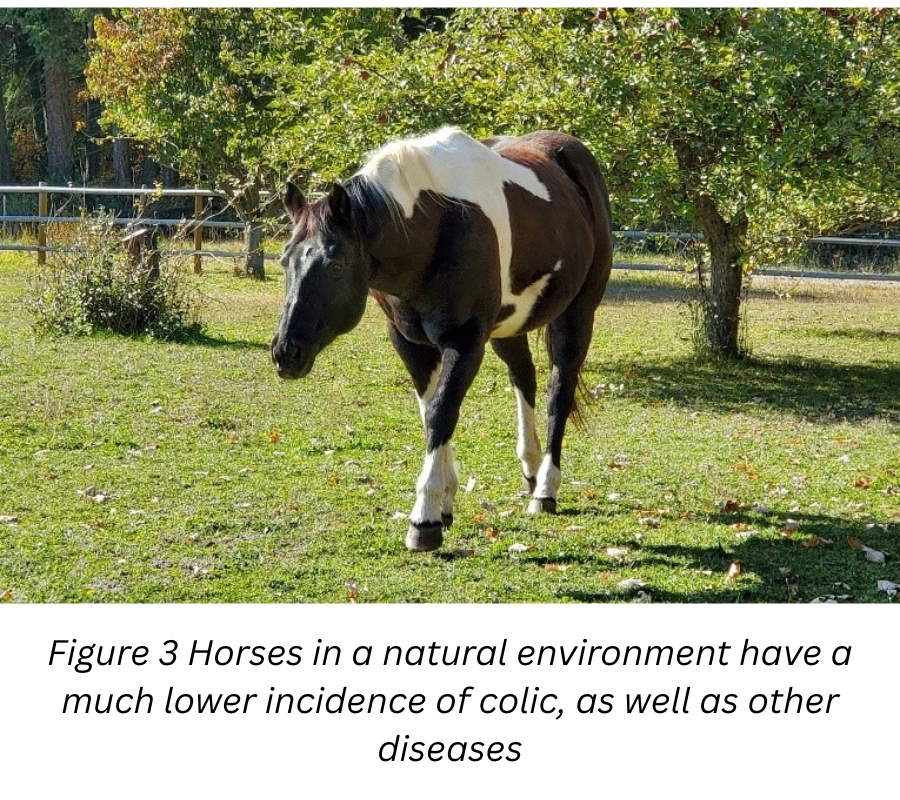
Change Your Horse-Keeping Practices
- Do not confine horses — ever! Stalls and small paddocks are a big no! Horses need lots of space to forage, play, run; let them be healthy horses. (Try locking yourself up in your bedroom for a couple of weeks with no phone and no friends and see how it affects your health.)
- Wait for horses to cool down after exertion before they drink too much.
- Don’t over-exercise horses who are not physically fit. That’s like you trying to run 5 kilometres if you haven’t run in months or years. You will end up with nausea and a bellyache and very sore muscles. Work up their fitness levels slowly and condition them gradually.
- Don’t work any horse to the point of fatigue! Learn how to recognize signs of stress in your horses and do your best to keep levels at a minimum. This will prevent not only colic but a whole host of other health problems. Emotional stress is a critical component of all health conditions, especially digestive ones.
- Performance horses need down time and lots of freedom to relax and enjoy themselves with other horses. Forage, freedom, and friendship go a long way in preventing a number of health problems. And in improving performance! Treat horses like horses and not like pampered poodles, no matter how much money you have in the game.
- Use caution with long-term medications especially non-steroidal anti-inflammatories, proton-pump inhibitors, and antibiotics. Most drugs alter the microbiome, cause nutrient deficiencies, and interfere with healthy digestion.
Recommended Steps & Remedies for Acute Colic
- Call your vet and start walking while you wait. So long as your horse is not in too much pain, walking can help calm them (and you) by relaxing the intestines and promoting an increase in peristalsis (intestinal movement), which can help move blocked ingesta or dissipate gas.
- Don’t let them eat until the symptoms subside. Take their hay and feed away and take them off the grass until they pass manure and the colic resolves.
- Use caution if you put them in a stall in case they roll or thrash about and injure themselves. It’s better to give them freedom of movement.
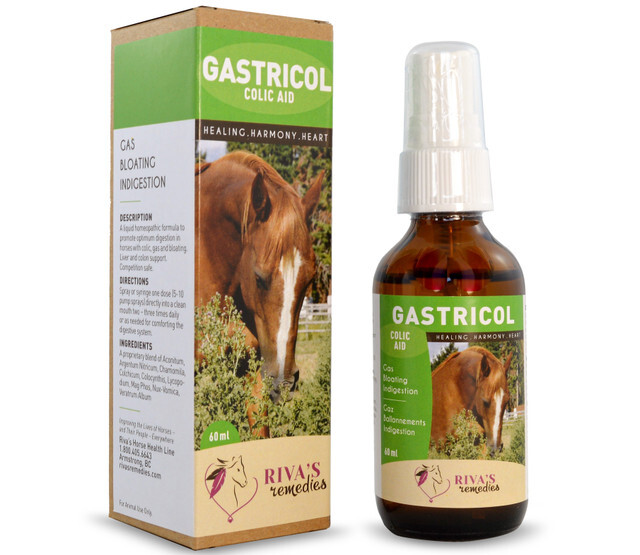 Gastricol, homeopathic: Give one dose (5-10 pump sprays) directly into the mouth every half hour to one or two hours. Gastricol is the first aid go-to and can often give horses fast-acting relief.
Gastricol, homeopathic: Give one dose (5-10 pump sprays) directly into the mouth every half hour to one or two hours. Gastricol is the first aid go-to and can often give horses fast-acting relief.
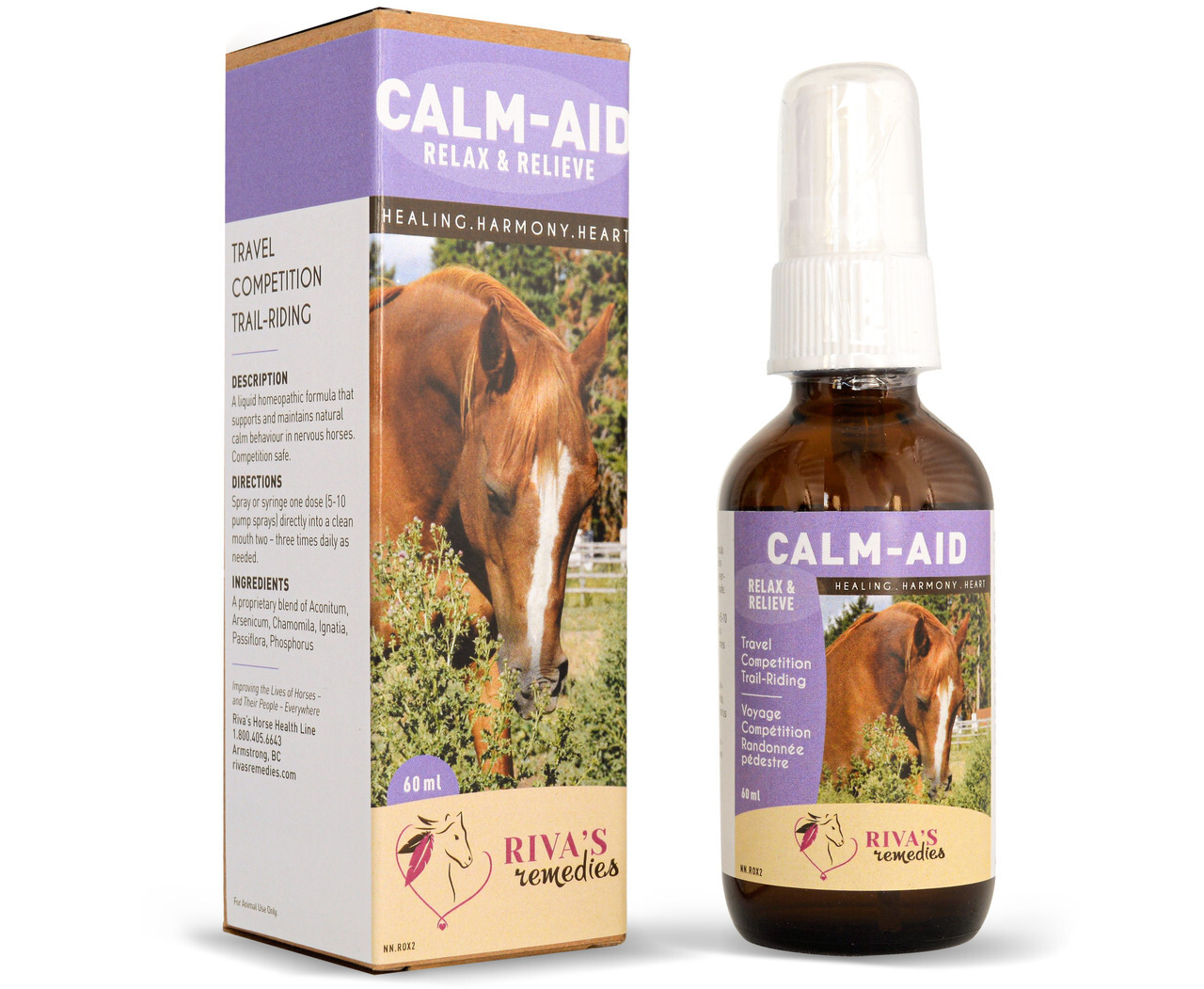 Calm-Aid, homeopathic: Horses get scared during physical distress which exacerbates the pain. Give one dose (5 to 10 pump sprays) every hour or two, or as needed to support the nervous system and promote relaxation.
Calm-Aid, homeopathic: Horses get scared during physical distress which exacerbates the pain. Give one dose (5 to 10 pump sprays) every hour or two, or as needed to support the nervous system and promote relaxation.
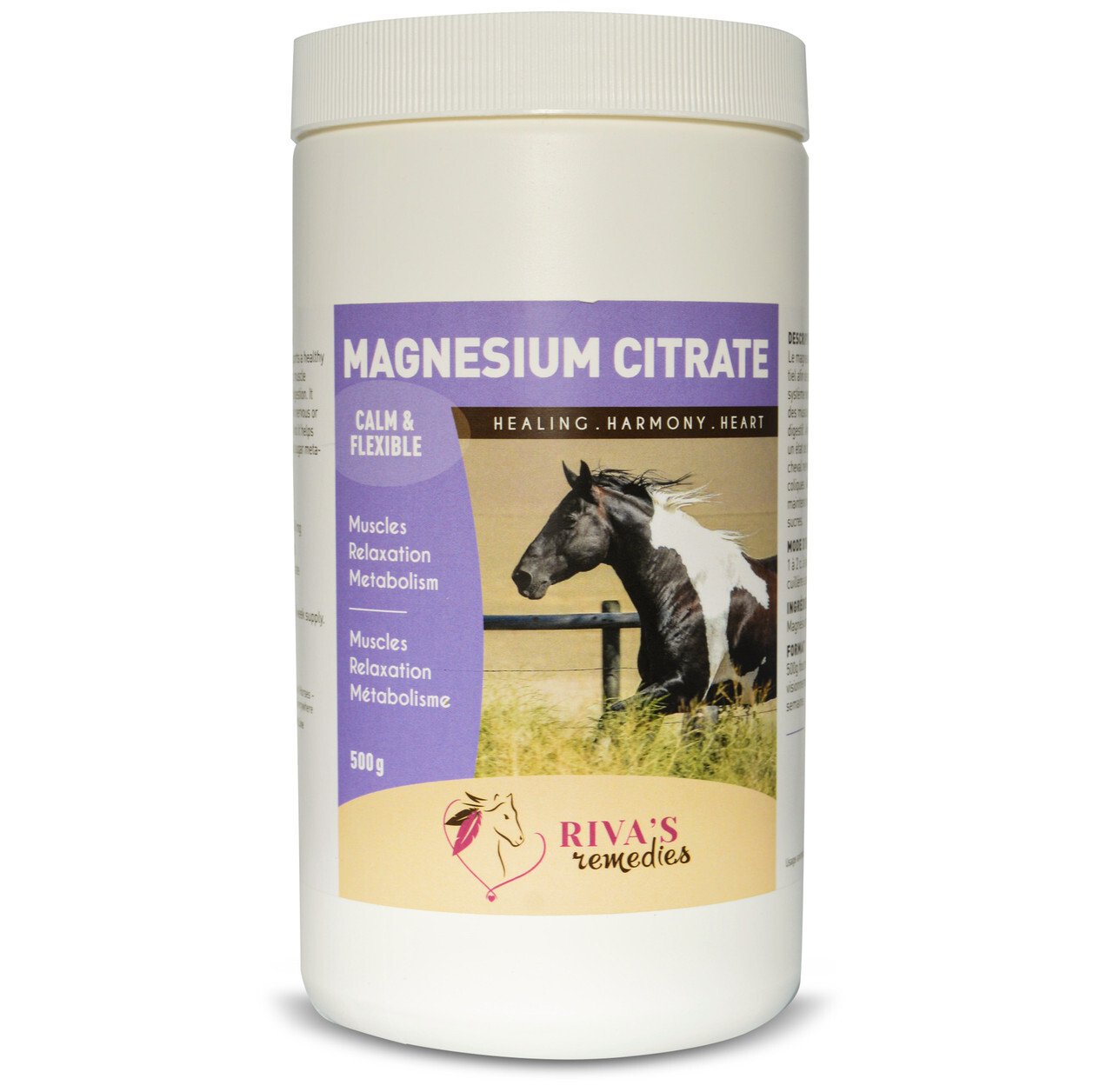 Magnesium Citrate: Syringe 1 to 2 Tbsp dissolved in water. (1 Tbsp = 1,540 mg). Magnesium helps to relax the intestines and is a natural anti-spasmodic. Supports the nervous system and adrenal function in anxious horses.
Magnesium Citrate: Syringe 1 to 2 Tbsp dissolved in water. (1 Tbsp = 1,540 mg). Magnesium helps to relax the intestines and is a natural anti-spasmodic. Supports the nervous system and adrenal function in anxious horses.
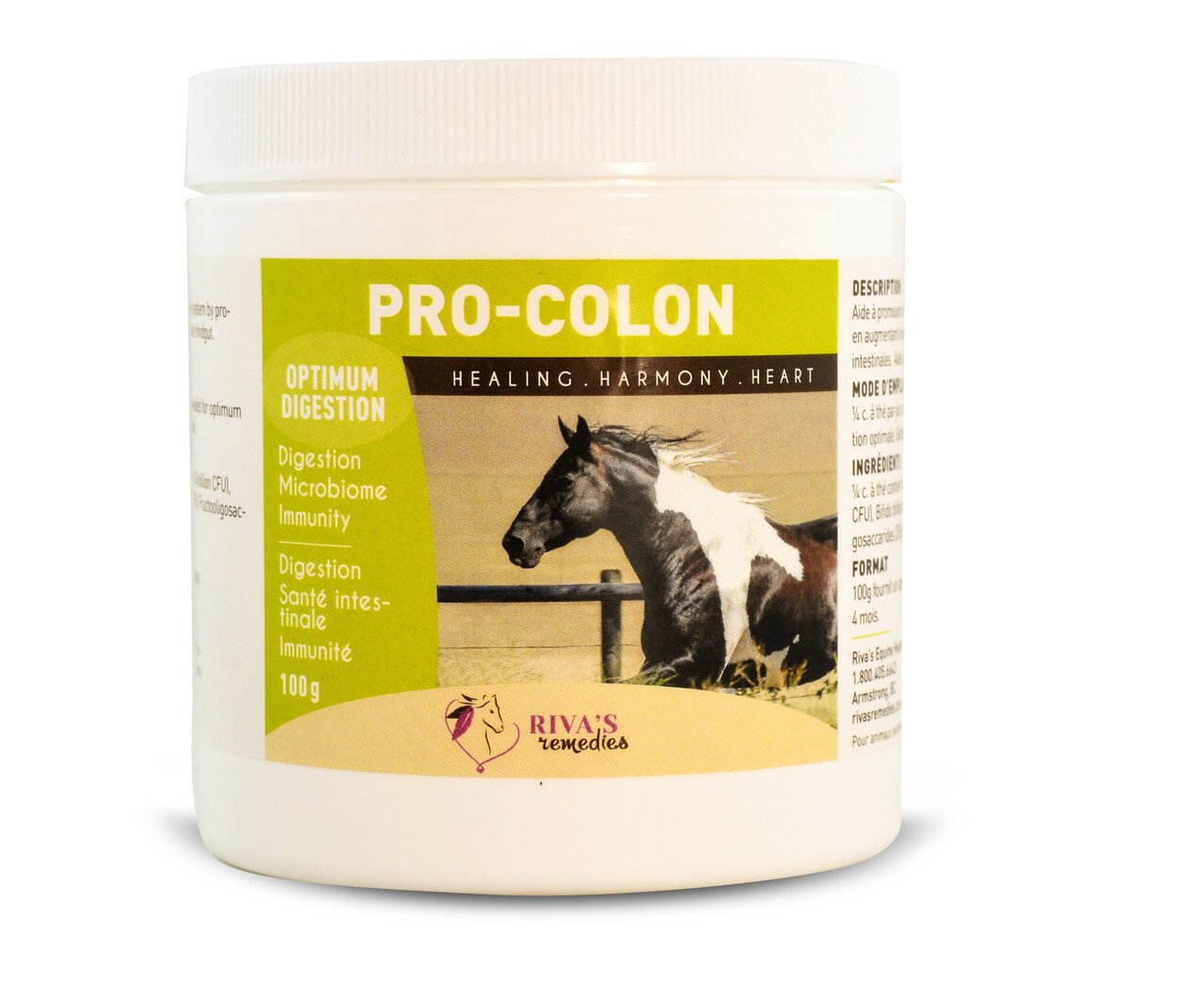 Pro-Colon probiotics: An unbalanced microbiome is a significant problem with colic. Syringe into the mouth ¼ tsp dissolved in a small amount of clean water. Supports efficient hindgut fermentation and optimum digestion.
Pro-Colon probiotics: An unbalanced microbiome is a significant problem with colic. Syringe into the mouth ¼ tsp dissolved in a small amount of clean water. Supports efficient hindgut fermentation and optimum digestion.
Remedies for Chronic Colic
Identify any stressors – emotional, physical, or lifestyle. What a horse experiences as significant stress might not be obvious to us.
 Magnesium Citrate: Syringe 1 to 2 Tbsp dissolved in water. (1 Tbsp = 1,540 mg). Magnesium helps to relax the intestines and is a natural anti-spasmodic. It supports the nervous system and adrenal function in anxious horses.
Magnesium Citrate: Syringe 1 to 2 Tbsp dissolved in water. (1 Tbsp = 1,540 mg). Magnesium helps to relax the intestines and is a natural anti-spasmodic. It supports the nervous system and adrenal function in anxious horses.
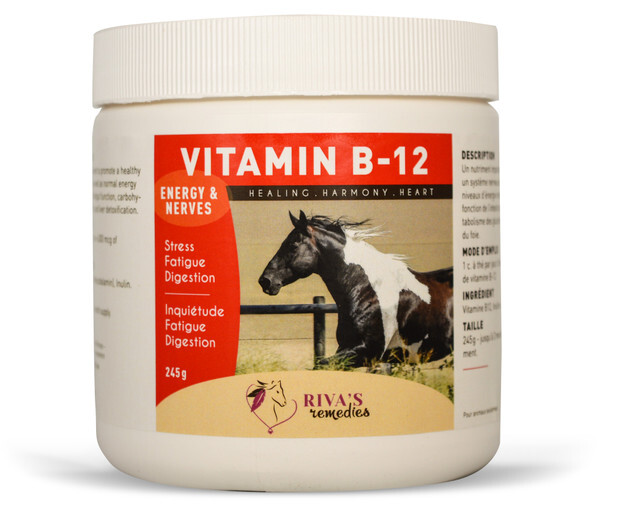 Vitamin B12: 1 to 2 tsp daily (one tsp = 6,000 mcg) - Plays a role in liver and hindgut detoxification. Also supports the nervous system. Promotes healthy energy levels and may improve their appetite.
Vitamin B12: 1 to 2 tsp daily (one tsp = 6,000 mcg) - Plays a role in liver and hindgut detoxification. Also supports the nervous system. Promotes healthy energy levels and may improve their appetite.
 Pro-Colon probiotics: ¼ tsp daily - Maintains a healthy microbiome, supports nutrient absorption, and the intestinal immune system. Aids leaky gut.
Pro-Colon probiotics: ¼ tsp daily - Maintains a healthy microbiome, supports nutrient absorption, and the intestinal immune system. Aids leaky gut.
 Baking soda: 2-3 tsp daily - Helps to neutralize excess acidity, which is important because hyperacidity is a common contributor to a number of digestive health conditions that are associated with colic: ulcers, intestinal infections, bacterial overgrowth, disturbances in the microbiome, and leaky gut.
Baking soda: 2-3 tsp daily - Helps to neutralize excess acidity, which is important because hyperacidity is a common contributor to a number of digestive health conditions that are associated with colic: ulcers, intestinal infections, bacterial overgrowth, disturbances in the microbiome, and leaky gut.
 Five Herb Digest herbal blend: ¼ cup daily - Supports feed digestion and calms and soothes a nervous intestinal tract.
Five Herb Digest herbal blend: ¼ cup daily - Supports feed digestion and calms and soothes a nervous intestinal tract.
The After Care
Colic is traumatic for horses (and their people) and can really scare them, affecting them both physically and emotionally. Some horses feel quite exhausted after recovering and need help to get their energy levels back up. Others need support for their nerves. And all of them need help to cleanse the intestinal tract, restore the balance of the microbiome, support the intestinal immune system, and optimize digestion and nutrient absorption. A healthy hindgut also helps them to resist toxic bacteria, parasites, and leaky gut.
Keep the diet simple: or two of soaked beet pulp (if tolerated), and ½ to 1 cup of soothing wheat bran mash (wheat bran moistened with warm water) is all they need until they are feeling stronger. Absolutely no grain. Continue with the other supplements as needed including the Pro-Colon probiotics.
Assess your horse’s stress levels to prevent reoccurring episodes. Horses are stoic but are also dedicated to doing their jobs, so many riders are unaware that their horses are still suffering. Take a step back and look at your horse’s life through their eyes.
Maggie’s Story
The Riva’s Remedies team have guided many, many successful cases that we could share with you. Our colic protocol has proven itself time and time again. Even many horses who were in the vet hospital but were not responding to treatment were brought home to restore their health with holistic modalities.
But the cases that stand out in my mind are the emotional stories of horses who do not respond to the physical or nutritional support nor the veterinarian treatment. In these types of cases, even if they do respond, the colic returns within hours or days, at which point it is then considered chronic. The advice then is to “wait and see” or as a last resort undergo exploratory surgery.
One time I was asked to come out to a farm where one of the mares, a Thoroughbred named Maggie, was in her third week of chronic colic symptoms. Maggie did not respond to veterinary care and the owners were not sure what they could do further to help her. Maggie was the companion of one of the teenage daughters. They spent a lot of time hanging out together and were closely bonded. There is always something special about that bond that younger girls have with their horses and, like all good relationships, the horses want to keep them going.
Before I did anything or tested any of the energy points, I heard a bit of a commotion. A fluffy, furry, and 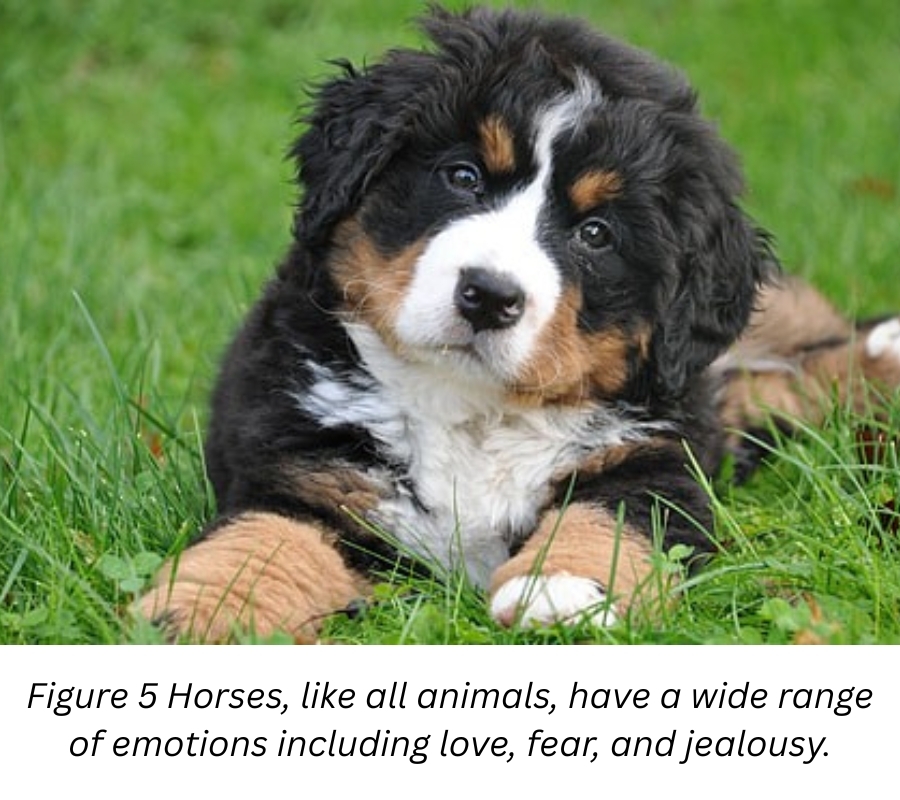 happy Bernese Mountain puppy came flying out the front door of the house and ran straight to the paddock, where we were all standing with Maggie. Maggie’s facial expression changed quickly, reflecting just how she was feeling about this new addition to the family! And, when the puppy tried to drink out of Maggie’s water trough, Maggie marched right over and shoved him out of the way. I asked the family when the puppy had arrived. As suspected, the puppy had arrived just two weeks prior on the day that Maggie first started cramping. And relationship stress usually expresses itself through the hindgut/second chakra.
happy Bernese Mountain puppy came flying out the front door of the house and ran straight to the paddock, where we were all standing with Maggie. Maggie’s facial expression changed quickly, reflecting just how she was feeling about this new addition to the family! And, when the puppy tried to drink out of Maggie’s water trough, Maggie marched right over and shoved him out of the way. I asked the family when the puppy had arrived. As suspected, the puppy had arrived just two weeks prior on the day that Maggie first started cramping. And relationship stress usually expresses itself through the hindgut/second chakra.
It was obvious that Maggie was not sharing the family’s excitement. She was worried and jealous that she would be replaced and that her special girl would no longer pay attention to her. But the puppy didn’t even have a clue as to what this was all about; he just wanted to be friends with Maggie. Nevertheless, this puppy was a real threat!
So, from there our job was to reassure Maggie that she was not going to be replaced and to relieve her emotional distress.
Aside from a little Magnesium Citrate to calm her nerves and relax her intestines, we chose to go with the homeopathic Calm-Aid, and two specific flower essences: Holly (sibling rivalry and feeling unloved) and chamomile (calming emotional trauma in relationships). I also recommended homeopathic Ignatia to soothe her sadness and her feelings of abandonment. And of course, Maggie’s teenage companion was advised to spend a lot of time with Maggie reassuring her that she was still an important part of her life and that the puppy was not there to replace her or steal her love.
All turned out well…Maggie’s colic subsided shortly after. And the puppy got to stay. The most important part for Maggie was that she was able to express her feelings and was finally heard. Horses have the same emotional needs as people do and oftentimes, they just want us to know that they need that extra care and attention.
